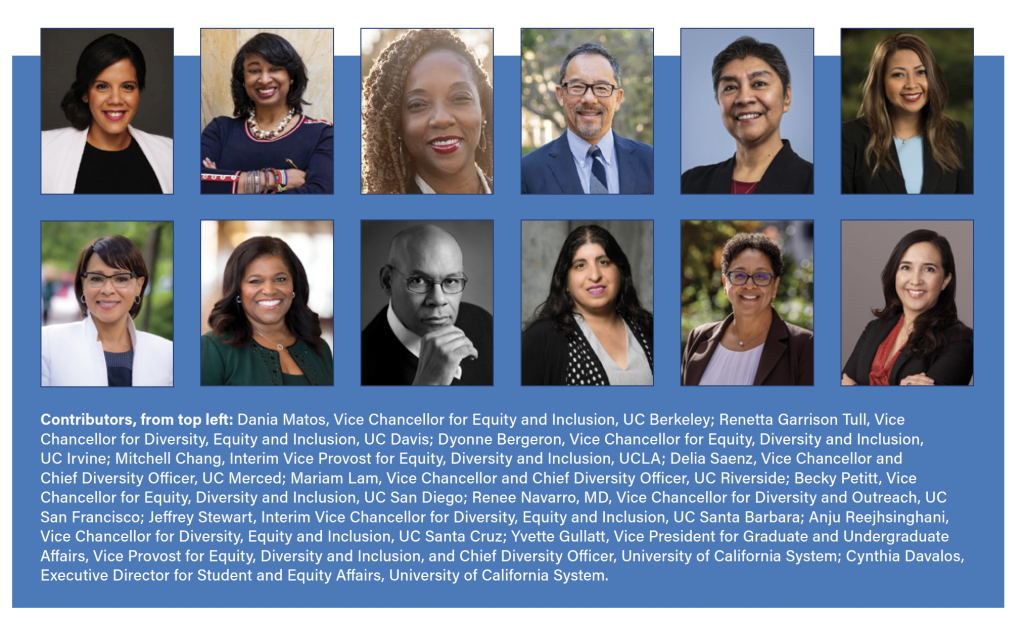If the media is to be believed, the future of the senior diversity officer in higher education is bleak. But is it really? Institutions wary of the battle to unwind the work of equity, inclusion, justice, and belonging would do well to invest in leaders whose work epitomizes its core values. At the same time, success in these roles increasingly depends on the ability to work creatively and collaboratively toward the pursuit of common goals. As vice chancellors for equity and inclusion for the 10 campuses of the University of California (UC) system, we share our perspective on how, even in politically charged times, senior diversity leaders can play central roles in the success of wider campus priorities.
Although UC has provided pathways to social mobility for countless Californians, those efforts took place over the past three decades in environments that were often hostile to equity and inclusion. In 1996, California voters passed a statewide ballot initiative, Proposition 209, that eliminated consideration of race in public education, contracting, and hiring. Prop 209 — and its counterparts in other states — impacted all areas of admissions, outreach, and recruitment, not only by limiting tools to create thriving and inclusive campuses but also by chilling climates for many students from marginalized communities.
“As we have become more diverse and reflective of our state, we have also become better as an institution.”
Prop 209 has slowed our efforts to establish truly fair, equitable, and inclusive campus spaces. Yet by upholding core UC values ensuring equitable access, we have nearly returned to pre-1996 levels of demographic diversity, with Chicane/Latine students as our largest population. Five of our campuses have been designated as Hispanic- and Minority-Serving Institutions, and eight of our nine undergraduate campuses hold Association of American Universities status. Our newer faculty ranks are at their most diverse in UC history. Indeed, UC serves a high percentage of first-generation and low-income students who have some of the highest retention and graduation rates in the country. In short, as we have become more diverse and reflective of our state, we have also become better as an institution.
While credit must of course be shared with our incredible faculty, staff, and student leaders, it is important to acknowledge the impact of UC’s investment in senior diversity officers. Our work is grounded in scholarship, the importance of building and expanding partnerships, and a deep understanding of institutional priorities.
Our professional backgrounds are distinct; we represent faculty and senior administrators trained in medicine, science and engineering, the arts, social sciences, humanities, and education. Our trajectories connect through the continually evolving scholarship of inclusion. We, and our teams, daily disrupt popular perceptions that “diversity work” does not require any particular expertise. On the contrary, today’s senior diversity officers must lead with a rigorous understanding not only of their own fields of practice, thus connecting them to the academic and professional missions of their institutions, but an ability to meet colleagues, students, and community members where they are with empathy, awareness, and an informed spirit of collaboration.
These partnerships, the result of deep engagement and active capacity building, are a senior diversity officer’s anchor in times of turmoil. UC’s vice chancellors and vice provosts for equity and inclusion support emerging leaders across the university through the UC-Coro Systemwide Leadership Collaborative cohort projects.
“Today’s senior diversity officers must lead with a rigorous understanding not only of their own fields of practice, thus connecting them to the academic and professional missions of their institutions, but an ability to meet colleagues, students, and community members where they are with empathy, awareness, and an informed spirit of collaboration.”
UC San Diego’s vice chancellor led a campuswide initiative that resulted in the campus’ first-ever Strategic Plan for Inclusive Excellence. This plan is a model for fostering greater inclusivity and belonging using best practices and accountability measures applicable to all campus units.
The vice chancellor at UC Davis champions their Diversity and Inclusion Strategic Vision, which includes an implementation plan that every campus unit can use to embed institutional values into their work.
At UC Merced, the vice chancellor develops peers to serve as equity-minded leaders, thereby helping to cultivate, through stronger leadership practices, a campus community that is fair and inclusive for all.
UC Santa Cruz’s vice chancellor has been a key partner in strategic planning efforts to shape campus priorities over the next decade.
UC San Francisco launched a comprehensive antiracism initiative that includes the work of the campus and health system. The result has been more leaders across the university better prepared to strengthen equity and inclusion in challenging times.
Finally, senior diversity officers must also possess a sophisticated financial nimbleness to ensure that resources align with needs and strengthen the institution’s investment in fairness and equity. For example, UC Berkeley’s vice chancellor works with donors to fund student resource centers. UC Davis’ vice chancellor garners federal grants for mentoring and disability programs, and the vice chancellors at UC Riverside, UC Santa Barbara, UC Merced, and UC Irvine have received prestigious grants to advance faculty diversity.
At UC San Francisco, the vice chancellor has secured federal funds for pathway programs and maintains a strong alumni base of donor support. Careful management of funds is a crucial skill, involving not only a readiness to advocate for funds but the willingness to understand budgets and the institution’s budgeting process, as well as the capacity to cultivate relationships with donors or external funders and their value propositions. Successful diversity leaders develop partnerships across campus that can lead to collaborative funding proposals for mutual gain.
We realize how difficult the current moment is for many, if not most, of our peers nationwide, especially those whose roles have already or may soon be eliminated. Yet, for institutions still on the fence about the value of maintaining diversity offices, we hope that our perspective offers tangible glimpses into the successes that can be achieved when all campus leaders are invested in the pursuit of more equitable outcomes. Despite efforts to divide us, this work requires ongoing campus and community support for long-term change to be possible. As senior diversity leaders, we stand stronger together and with those who, like us, support building a system of higher education where the benefits accrue to all.●
This article was written by the University of California Council of Vice Chancellors for Equity and Inclusion and published in our October 2023 issue.






















